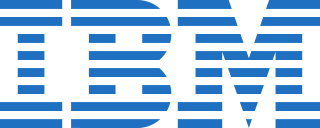Related Research Articles

AIX is a series of proprietary Unix operating systems developed and sold by IBM for several of its computer platforms.
Grid computing is the use of widely distributed computer resources to reach a common goal. A computing grid can be thought of as a distributed system with non-interactive workloads that involve many files. Grid computing is distinguished from conventional high-performance computing systems such as cluster computing in that grid computers have each node set to perform a different task/application. Grid computers also tend to be more heterogeneous and geographically dispersed than cluster computers. Although a single grid can be dedicated to a particular application, commonly a grid is used for a variety of purposes. Grids are often constructed with general-purpose grid middleware software libraries. Grid sizes can be quite large.

Db2 is a family of data management products, including database servers, developed by IBM. It initially supported the relational model, but was extended to support object–relational features and non-relational structures like JSON and XML. The brand name was originally styled as DB2 until 2017, when it changed to its present form.
MOSIX is a proprietary distributed operating system. Although early versions were based on older UNIX systems, since 1999 it focuses on Linux clusters and grids. In a MOSIX cluster/grid there is no need to modify or to link applications with any library, to copy files or login to remote nodes, or even to assign processes to different nodes – it is all done automatically, like in an SMP.
HTCondor is an open-source high-throughput computing software framework for coarse-grained distributed parallelization of computationally intensive tasks. It can be used to manage workload on a dedicated cluster of computers, or to farm out work to idle desktop computers – so-called cycle scavenging. HTCondor runs on Linux, Unix, Mac OS X, FreeBSD, and Microsoft Windows operating systems. HTCondor can integrate both dedicated resources and non-dedicated desktop machines into one computing environment.
WebSphere Application Server (WAS) is a software product that performs the role of a web application server. More specifically, it is a software framework and middleware that hosts Java-based web applications. It is the flagship product within IBM's WebSphere software suite. It was initially created by Donald F. Ferguson, who later became CTO of Software for Dell. The first version was launched in 1998. This project was an offshoot from IBM HTTP Server team starting with the Domino Go web server.

United Devices, Inc. was a privately held, commercial volunteer computing company that focused on the use of grid computing to manage high-performance computing systems and enterprise cluster management. Its products and services allowed users to "allocate workloads to computers and devices throughout enterprises, aggregating computing power that would normally go unused." It operated under the name Univa UD for a time, after merging with Univa on September 17, 2007.
UNICORE (UNiform Interface to COmputing REsources) is a grid computing technology for resources such as supercomputers or cluster systems and information stored in databases. UNICORE was developed in two projects funded by the German ministry for education and research (BMBF). In European-funded projects UNICORE evolved to a middleware system used at several supercomputer centers. UNICORE served as a basis in other research projects. The UNICORE technology is open source under BSD licence and available at SourceForge.
In computing, a Parallel Sysplex is a cluster of IBM mainframes acting together as a single system image with z/OS. Used for disaster recovery, Parallel Sysplex combines data sharing and parallel computing to allow a cluster of up to 32 systems to share a workload for high performance and high availability.
Job Submission Description Language is an extensible XML specification from the Global Grid Forum for the description of simple tasks to non-interactive computer execution systems. Currently at version 1.0, the specification focuses on the description of computational task submissions to traditional high-performance computer systems like batch schedulers.

Platform Computing was a privately held software company primarily known for its job scheduling product, Load Sharing Facility (LSF). It was founded in 1992 in Toronto, Ontario, Canada and headquartered in Markham, Ontario with 11 branch offices across the United States, Europe and Asia.
Distributed Resource Management Application API (DRMAA) is a high-level Open Grid Forum (OGF) API specification for the submission and control of jobs to a distributed resource management (DRM) system, such as a cluster or grid computing infrastructure. The scope of the API covers all the high level functionality required for applications to submit, control, and monitor jobs on execution resources in the DRM system.
IBM Spectrum Symphony, previously known as IBM Platform Symphony and Platform Symphony, is a high-performance computing (HPC) software system developed by Platform Computing, the company that developed Load Sharing Facility (LSF). Focusing on financial services, Symphony is designed to deliver scalability and enhances performance for computationally intensive risk and analytical applications. The product lets users run applications using distributed computing.

A computer cluster is a set of computers that work together so that they can be viewed as a single system. Unlike grid computers, computer clusters have each node set to perform the same task, controlled and scheduled by software. The newest manifestation of cluster computing is cloud computing.
SynfiniWay was middleware with which a virtualised IT framework can be created that provides a uniform and global view of resources within a department, a company, or a company with its suppliers. This virtualised IT framework is service-oriented, meaning that applications are run as services, which are a system-independent view of applications. Several applications can be linked in a workflow, and data exchange between the applications participating in the workflow is implicitly managed by the IT framework. SynfiniWay is platform-independent, allowing almost any distributed heterogeneous platform to be linked into its virtualised IT framework.

gLite is a middleware computer software project for grid computing used by the CERN LHC experiments and other scientific domains. It was implemented by collaborative efforts of more than 80 people in 12 different academic and industrial research centers in Europe. gLite provides a framework for building applications tapping into distributed computing and storage resources across the Internet. The gLite services were adopted by more than 250 computing centres, and used by more than 15000 researchers in Europe and around the world.

The Slurm Workload Manager, formerly known as Simple Linux Utility for Resource Management (SLURM), or simply Slurm, is a free and open-source job scheduler for Linux and Unix-like kernels, used by many of the world's supercomputers and computer clusters.

OpenNebula is an open source cloud computing platform for managing heterogeneous data center, public cloud and edge computing infrastructure resources. OpenNebula manages on-premises and remote virtual infrastructure to build private, public, or hybrid implementations of Infrastructure as a Service and multi-tenant Kubernetes deployments. The two primary uses of the OpenNebula platform are data center virtualization and cloud deployments based on the KVM hypervisor, LXD/LXC system containers, and AWS Firecracker microVMs. The platform is also capable of offering the cloud infrastructure necessary to operate a cloud on top of existing VMware infrastructure. In early June 2020, OpenNebula announced the release of a new Enterprise Edition for corporate users, along with a Community Edition. OpenNebula CE is free and open-source software, released under the Apache License version 2. OpenNebula CE comes with free access to patch releases containing critical bug fixes but with no access to the regular EE maintenance releases. Upgrades to the latest minor/major version is only available for CE users with non-commercial deployments or with significant open source contributions to the OpenNebula Community. OpenNebula EE is distributed under a closed-source license and requires a commercial Subscription.
OpenLava is a workload job scheduler for a cluster of computers. OpenLava was pirated from an early version of Platform LSF. Its configuration file syntax, application program interface (API), and command-line interface (CLI) have been kept unchanged. Therefore, OpenLava is mostly compatible with Platform LSF.
References
- ↑ "What's new in IBM Spectrum LSF Version 10.1 Fix Pack 14". IBM . Retrieved 2023-07-02.
- ↑ Mike Ault; Madhu Tumma (2004). Oracle 10g Grid & Real Application Clusters. Rampant TechPress. p. 24. ISBN 978-0-9744355-4-1.
- ↑ Goering, Richard (March 8, 1999). "Load sharing brings kudos". EE Times Online. Archived from the original on 2011-05-16. Retrieved 2007-11-12.
LSF ... enables load sharing by distributing jobs to available CPUs in heterogeneous networks ... but don't tell them that; they'll just want to raise their prices
- ↑ Zhou, Songnian; Wang, Jingwen; Zheng, Xiaohu; Delisle, Pierre (1993). "Utopia: A Load Sharing Facility for Large, Heterogeneous Distributed Computer Systems". CiteSeerX 10.1.1.121.1434 .
- ↑ "Platform Lava". Archived from the original on 2011-04-21. Retrieved 2011-03-25.
- ↑ IBM Closes on Acquisition of Platform Computing